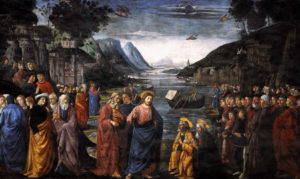Thoughts on Sunday’s Lessons for July 8, 2018

Jesus commissioning the Twelve Apostles (1481), fresco by Domenico Ghirlandaio (1449-1494). Sistine Chapel, Vatican City, Rome. (Click image to enlarge.)
First Reading (Track One): 2 Samuel 1:1, 17-27
David has mourned the deaths of King Saul and Saul’s son Jonathan, David’s beloved friend. Now David is called by all the tribes and elders to be formally anointed king over all Israel: both the Northern Kingdom with its capital at Hebron, and Judah, the Southern Kingdom, where Jerusalem is the capital. The elders, who had sworn fealty to Saul, now pledge loyalty to David, recognizing that God had called him to be shepherd over Israel. David was to reign for 40 years, becoming greater and greater and earning for Jerusalem the title “City of David.”
First Reading (Track Two): Ezekiel 2:1-5
It’s frustrating when we have something to say, but people won’t listen. It doesn’t feel good, does it? Hold this thought as we hear Sunday’s Track Two readings, as each connects in some way with this spiritual challenge. In our first reading, God calls Ezekiel to prophesy to Israel, an impudent and stubborn people who have rebelled against God. They may choose to hear or not to hear, Ezekiel is told; but he is to speak truth so they will know that they have heard a prophet.
Psalm (Track One): Psalm 48
Our Psalm echoes the founding narrative of Israel’s kingdom in Jerusalem, Royal David’s City, where the first temple would be built atop Zion, God’s holy mountain. The Psalmist sings praise to the greatness of God, who placed the city of the great king on the lofty hill of Zion, the very center of the world. Let the kings of the earth who might march on Zion in hope of conquest look and be astounded, the Psalmist sings. Let them writhe and tremble and run away, for God has established this citadel forever.
Psalm (Track Two): Psalm 123
Traditionally understood as a “song of ascent” as the priests and people go up to the Temple in formal procession, Psalm 123 calls on our merciful God to hear the peoples’ prayer. They have suffered the contempt, scorn and derision of the indolent rich – something like Israel’s “one percent” as seen from their lowly state. Now they lift up their eyes to God enthroned in the heavens, asking for mercy.
Second Reading: 2 Corinthians 12:2-10
This passage is the last of seven readings that we have heard this summer in Second Corinthians. These verses are framed by Paul’s angry and sarcastic dissertation about a group of missionaries that he calls “super-apostles,” who apparently came to Corinth after he left, bringing ideas differing entirely from his own. Bible historians and theologians aren’t sure what Paul means about the “third heaven” or the unknown “thorn” that troubles him. But the ambiguity ends when he makes his point: Through prayer and reliance on God’s grace through Christ, we all can struggle successfully, despite our weakness, to endure hardships that come from both within and without.
Gospel: Mark 6:1-13
Growing crowds have been following Jesus around Galilee as he teaches and heals, and now they follow him back home to Nazareth. His old neighbors and friends are astounded at first, too, by his teaching and preaching in the synagogue. But then they remember that they know this guy. He’s the carpenter’s son! What makes him so high and mighty? Indeed, Jesus said, prophets are not without honor except in their home town. Then he sends out his followers, two by two, to tell the good news, but he warns them to expect more of the same. Don’t dress up, he says. Don’t act special. If people won’t welcome you for the word you bring, move on down the road until you find people who will.
What are “Track 1” and “Track 2”?
During the long green season after Pentecost, there are two tracks (or strands) each week for Old Testament readings. Within each track, there is a Psalm chosen to accompany the particular lesson.
The Revised Common Lectionary allows us to make use of either of these tracks, but once a track has been selected, it should be followed through to the end of the Pentecost season, rather than jumping back and forth between the two strands.
For more information from LectionaryPage.net, click here.
